英语固定句型
小学英语固定句式62种

小学英语固定句式句型1:There+be +主语+地点状语/ 时间状语There's a boat in the river. 河里有条船。
句型2:What's wrong with+sb. / sth. ?What's wrong with your watch?你的手表有什么毛病?句型3:How do you like...?How do you like China?你觉得中国怎么样?句型4:What do you like about...?What do you like about China?你喜欢中国的什么?句型5:had better(not)+动词原形You'd better ask that policeman over there. 你最好去问问那边的那个警察。
句型6:How+adj. / adv. +主语+谓语!What a/ an+adj. +n. +主语+谓语!How cold it is today!今天多冷啊!What a fine picture it is!多美的一幅图画呀!句型7:Thank+sb. +for(doing)sth.Thank you for coming to see me. 感谢你来看我。
句型8:So+be/ 情态动词/ 助动词+主语He is a student. So am I. 他是一个学生,我也是。
句型9:... not ... until ...He didn't have supper until his parents came back. 直到他的父母回来他才吃饭。
句型10:比较级+and+比较级The baby cried harder and harder. 那孩子哭得越来越厉害。
句型11:the +比较级,the +比较级The more one has,the more one wants. 越有越贪。
高中英语固定句型大全
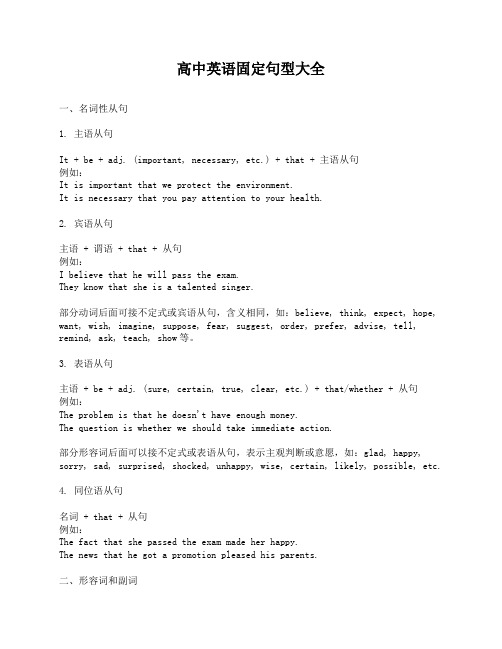
高中英语固定句型大全一、名词性从句1. 主语从句It + be + adj. (important, necessary, etc.) + that + 主语从句例如:It is important that we protect the environment.It is necessary that you pay attention to your health.2. 宾语从句主语 + 谓语 + that + 从句例如:I believe that he will pass the exam.They know that she is a talented singer.部分动词后面可接不定式或宾语从句,含义相同,如:believe, think, expect, hope, want, wish, imagine, suppose, fear, suggest, order, prefer, advise, tell, remind, ask, teach, show等。
3. 表语从句主语 + be + adj. (sure, certain, true, clear, etc.) + that/whether + 从句例如:The problem is that he doesn't have enough money.The question is whether we should take immediate action.部分形容词后面可以接不定式或表语从句,表示主观判断或意愿,如:glad, happy, sorry, sad, surprised, shocked, unhappy, wise, certain, likely, possible, etc.4. 同位语从句名词 + that + 从句例如:The fact that she passed the exam made her happy.The news that he got a promotion pleased his parents.二、形容词和副词1. 形容词的比较级和最高级比较级:主语 + be (am, is, are) + 形容词比较级 + than + 被比较的对象例如:She is taller than her sister.This book is more interesting than that one.最高级:主语 + be (am, is, are) + the + 形容词最高级 + 名词例如:He is the tallest boy in his class.This is the most beautiful painting I have ever seen.2. 常用的形容词和副词beautiful, handsome, pretty, ugly, lovely, attractive, stunning, gorgeous, charming, cute, elegant, fashionable, stylish, glamorous, delightful, etc.good, great, excellent, wonderful, fantastic, fabulous, amazing, awesome, splendid, terrific, marvelous, etc.bad, terrible, awful, horrible, unpleasant, etc.expensive, cheap, reasonable, affordable, etc.fast, slow, quick, rapid, swift, etc.loud, quiet, noisy, etc.hard, easy, difficult, challenging, simple, complicated, complex, etc.high, low, tall, short, long, big, small, huge, tiny, etc.young, old, new, ancient, modern, etc.3. 形容词和副词的用法形容词可修饰名词,也可作表语副词一般修饰动词、形容词或其他副词三、倒装句1. 完全倒装句在以下情况下要使用完全倒装句:a) 句首为表示地点、方式等的介词短语时例如:Under the tree were two cats.In this way, we can solve the problem.b) 句首为表示方位的副词或介词短语时例如:Here comes the bus.Out rushed the students.c) 句首为表示否定、副词only、hardly, seldom, never等时例如:Never have I seen such a beautiful sunset.Not only does he play the piano well, but he also sings well.d) 句首为so, neither, nor时例如:So busy was he that he forgot to eat lunch.Neither do I like English, nor do I like math.2. 部分倒装句在以下情况下要使用部分倒装句:a) 句首为表示条件的介词短语时例如:Should you need any help, please let me know.Had I known your address, I would have sent you a postcard.b) 句首为表示时间的介词短语或副词短语时例如:At no time should you give up your dream.On no account can he stay out late.四、虚拟语气1. 条件句中的虚拟语气a) “与事实相反的条件句”:如果对过去的情况进行虚拟,主句要用“动词的过去完成时”,从句用“动词的过去完成时”或“would/could/might + have + 过去分词”的形式。
【幼儿英语】固定词组及句型搭配(超完整)
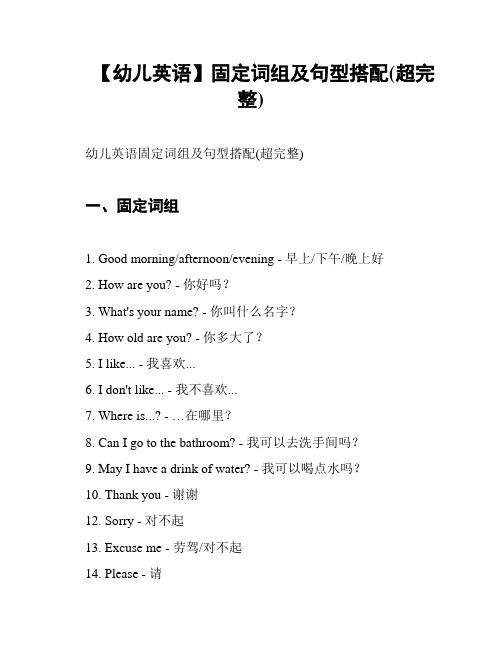
【幼儿英语】固定词组及句型搭配(超完整)幼儿英语固定词组及句型搭配(超完整)一、固定词组1. Good morning/afternoon/evening - 早上/下午/晚上好2. How are you? - 你好吗?3. What's your name? - 你叫什么名字?4. How old are you? - 你多大了?5. I like... - 我喜欢...6. I don't like... - 我不喜欢...7. Where is...? - …在哪里?8. Can I go to the bathroom? - 我可以去洗手间吗?9. May I have a drink of water? - 我可以喝点水吗?10. Thank you - 谢谢12. Sorry - 对不起13. Excuse me - 劳驾/对不起14. Please - 请二、句型搭配1. What's your favorite color? - 你最喜欢的颜色是什么?- My favorite color is... - 我最喜欢的颜色是...2. How many... do you have? - 你有多少个...?- I have... - 我有...3. Can you...? - 你会...吗?- Yes, I can. / No, I can't. - 是的,我会。
/ 不,我不会。
4. Where is the...? - ...在哪里?- It's... - 它在...5. What are you doing? - 你在做什么?- I'm... - 我正在...6. What's this? - 这是什么?- It's a... - 这是一个...7. Who is this? - 这是谁?- This is... - 这是...8. I want... - 我想要...- Can I have...? - 我可以有...吗?9. May I ask a question? - 我可以问一个问题吗?- Of course! - 当然可以!10. I'm sorry, I don't understand. - 对不起,我不明白。
高考英语固定句型总结
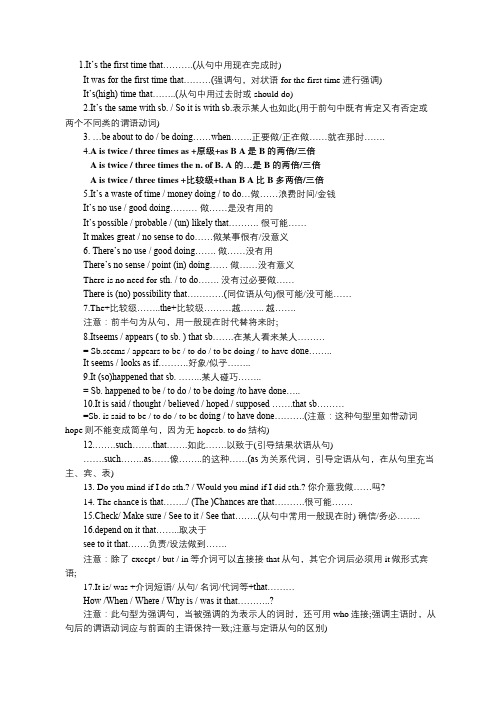
1.It’s the first time that……….(从句中用现在完成时)It was for the first time that………(强调句,对状语for the first time进行强调)It’s(high) time that……..(从句中用过去时或should do)2.It’s the same with sb. / So it is with sb.表示某人也如此(用于前句中既有肯定又有否定或两个不同类的谓语动词)3. …be about to do / be doing……when…….正要做/正在做……就在那时…….4.A is twice / three times as +原级+as B A是B的两倍/三倍A is twice / three times the n. of B. A的…是B的两倍/三倍A is twice / three times +比较级+thanB A比B多两倍/三倍5.It’s a waste of time / money doing / to do…做……浪费时间/金钱It’s no use / good doing……… 做……是没有用的It’s possible / probable / (un) likely that………. 很可能……It makes great / no sense to do……做某事很有/没意义6. There’s no use / good doing……. 做……没有用There’s no sense / point (in) doing…… 做……没有意义There is no need for sth. / to do……. 没有过必要做……There is (no) possibility that…………(同位语从句)很可能/没可能……7.The+比较级……..the+比较级………越…….. 越…….注意:前半句为从句,用一般现在时代替将来时;8.Itseems / appears ( to sb. ) that sb…….在某人看来某人………= Sb.seems / appears to be / to do / to be doing / to have d one……..It seems / looks as if……….好象/似乎……..9.It (so)happened that sb. ……..某人碰巧……..= Sb. happened to be / to do / to be doing /to have done…..10.It is said / thought / believed / hoped / supposed …….that sb………=Sb. is said to be / to do / to be doing / to have done……….(注意:这种句型里如带动词hope则不能变成简单句,因为无hopesb. to do结构)12.…….such…….that…….如此…….以致于(引导结果状语从句)…….such……..as……像……..的这种……(as为关系代词,引导定语从句,在从句里充当主、宾、表)13. Do you mind if I do sth.? / Would you mind if I did sth.? 你介意我做……吗?14. The chan ce is that……../ (The )Chances are that……….很可能…….15.Check/ Make sure / See to it / See that……..(从句中常用一般现在时) 确信/务必……..16.depend on it that……..取决于see to it that…….负责/设法做到…….注意:除了except / but / in等介词可以直接接that从句,其它介词后必须用it做形式宾语;17.It is/ was +介词短语/ 从句/ 名词/代词等+that………How /When / Where / Why is / was it that………..?注意:此句型为强调句,当被强调的为表示人的词时,还可用who连接;强调主语时,从句后的谓语动词应与前面的主语保持一致;注意与定语从句的区别)18.How is it that……..(这几个句型都表示“怎么会…….?” “怎么发生的?”)How come+从句?How does / did sth. come about? ( How did i tcome about that…….?)如:How come you are late again?19. There seems / appears / happens to be / must be / can’t be / is (are was were) saidto be / is (are was were) thought to be…….表示“.似乎有/碰巧有/一定有/不可能有/ 据说有/认为有……..”介词(如of )there beingwant /wish / expect there to be要/希望/期待有……..adj. /adv. enough for there to be…….足够…….会有…….注意:there being / there to be为therebe的非谓语形式;It is said / thought that there is / are……=Thereis / was / are / were said (thought) to be……. 如:Eg: I have never dream of there being such a good chance for me.It won’t be cold enough for there to be afrost tonight.20. 疑问词+插入语+陈述语序?Eg: Whodo you think he’ll have attend the meeting?21. But for + n. / pron. sb. / sth. would (not) have done…..要不是…….某人早就……(表示虚拟语气)=If it had not been for…..……./If there had not been ……..22. It won(’t) be long before +从句(从句中用一般现在时)不久/很久就要…….It was (not) long before+从句(从句中用一般过去时)不久/很久才……..23. Those who………….(从句及主句中谓语动词用复数形式).Anyone who…………= Whoever………..(从句及主句中谓语动词用单数形式)24…….主句(一般现在时或过去时)…...when从句….(might/ should do 或might / should have done) 表示”对比”意思为“本该……(可)而却”主句中为陈述语气从句里为虚拟语气Eg: Why are you here when you should be in school?你本该上学的怎么在这儿?He stopped trying when he might have succeeded .本该已成功了他却停止努力了.25. Thereis ./ Sb. have no doubt that………(同位语从句that不可省略) 毫无疑问……There is / Sb. have some doubt whether……..(同位语从句不可用if)不确定…是否…Sb. doubt if / whether……. 某人怀疑是否……Sb. don’t doubt that……… 某人不怀疑……26.immediately / directly / instantly / the moment +从句on / upon + n. / doingNo sooner had sb. done than …….(过去时)Hardly had sb. done when……..(过去时)注意:这几个结构都表示“一…….就”;27. everytime / each time / the last time / the first time / next time +从句(名词性短语引导一个时间状语句)anywhere / everywhere +从句(相当于wherever引导的地点状语从句)Eg: Youcan go anywhere you like.Next timeyou come please bring your son along.28.Ifonly / I wish +从句(用过去类时态) 表示虚拟语气“要是…….就好了” “但愿……就好了!”29.Considering+ n. 或 pron. 或 that从句/ Seeing that……….考虑到/鉴于…….Given + n. / pron作状语表示“在有……的情况下” “如果有” “假定”有时也表示”考虑到”Eg:Seeing (that) he refused to help us there is no reason why we should help himnow.Given good health I hope to finish the work this year.Given their inexperience / that they are inexperienced they’vedone a good job.30.Therewas a time when…….曾经有那么一度……….31.otherthan与no not none等否定词连用表示肯定意思如:Eg: It was none other than Mr. Smith.这正是Smith先生.32. Notuntil…….did / do/ does / will sb. do……It was / is not until ……that sb………33.It’s(un) like sb. to do / to have done……做某事很像某人/ 做某事可不像某人34.It remains to be seen Wh--words ……..是否…….还有待于看.(不用that if作连接词)35.It only remains for sb. to do……剩下的只是要某人做某事.Eg: We’vegot everything ready. It only remains for you to come to dinner.36.Onemoment……. and now………刚才一会儿还在做……而现在却……..37.Notall / both / everyone………表示部分否定38. Suchis / are……..这(些)就是…….(谓语动词单复数由后面名词决定)39.I’drather (not) do / have done……我宁愿…..I’drather +从句(从句中用过去时或过去完成时)40. It’simportant / necessary / strange / surprising….+that……(用陈述语气或shoulddo)41. Ilike / hate / appreciate it that / when等从句 (it表示后面从句的这种情况)Eg: I appreciate it if you will give me a hand.42. By the time +从句(一般现在时/过去时),主句(将来完成时/过去完成时)43……….as is often the case with sb. / as is usual with sb.(as引导非限制性定语从句)44 in case / lest / for fear that…….(从句中用陈述语气或shoulddo)45.While置于句首可表示Aslong as 或 AlthoughEg: While there is life there is hope.While I admit his good points I can see his bad ones.46. cannot ( never) ……too +adj. (adv. ) / adj. (adv.) + enough “越……越好”“非常”too + adj. ( anxious / eager / willing / ready / glad等)+todo….表示肯定意思Eg: I can’tthank you enough.我非常感激你.He wastoo glad to see his father.=He was very glad to see his father.47. not /neve等表示否定的词与比较级连用表示最高级,如:Eg:-----Doyou agree with his suggestion?-------I can’t agree more.48. Whatif……..要是…….怎么办?Eg:What if he doesn’t come tomorrow?49. more……..than与其…….不如……..Eg:He ismore nervous than frightened.50. It is/ has been +一段时间+since从句(从句中如为延续性动词则实际表示的意思相反) Eg:It is two years since he drank.他不喝酒已两年了.。
固定句式知识点总结
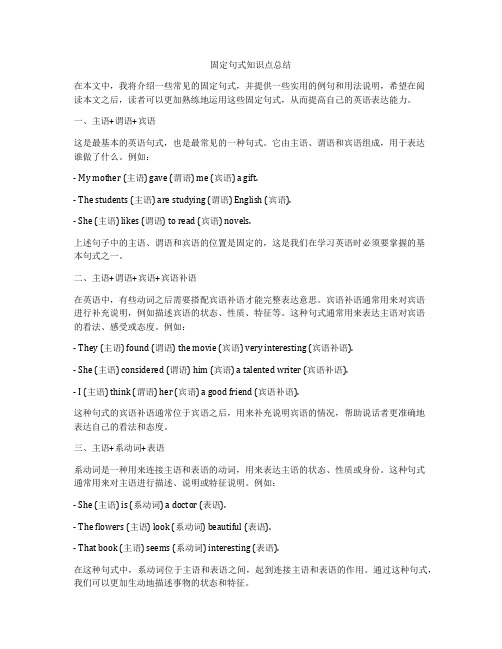
固定句式知识点总结在本文中,我将介绍一些常见的固定句式,并提供一些实用的例句和用法说明,希望在阅读本文之后,读者可以更加熟练地运用这些固定句式,从而提高自己的英语表达能力。
一、主语+谓语+宾语这是最基本的英语句式,也是最常见的一种句式。
它由主语、谓语和宾语组成,用于表达谁做了什么。
例如:- My mother (主语) gave (谓语) me (宾语) a gift.- The students (主语) are studying (谓语) English (宾语).- She (主语) likes (谓语) to read (宾语) novels.上述句子中的主语、谓语和宾语的位置是固定的,这是我们在学习英语时必须要掌握的基本句式之一。
二、主语+谓语+宾语+宾语补语在英语中,有些动词之后需要搭配宾语补语才能完整表达意思。
宾语补语通常用来对宾语进行补充说明,例如描述宾语的状态、性质、特征等。
这种句式通常用来表达主语对宾语的看法、感受或态度。
例如:- They (主语) found (谓语) the movie (宾语) very interesting (宾语补语).- She (主语) considered (谓语) him (宾语) a talented writer (宾语补语).- I (主语) think (谓语) her (宾语) a good friend (宾语补语).这种句式的宾语补语通常位于宾语之后,用来补充说明宾语的情况,帮助说话者更准确地表达自己的看法和态度。
三、主语+系动词+表语系动词是一种用来连接主语和表语的动词,用来表达主语的状态、性质或身份。
这种句式通常用来对主语进行描述、说明或特征说明。
例如:- She (主语) is (系动词) a doctor (表语).- The flowers (主语) look (系动词) beautiful (表语).- That book (主语) seems (系动词) interesting (表语).在这种句式中,系动词位于主语和表语之间,起到连接主语和表语的作用。
中考英语必背80个固定短语句型
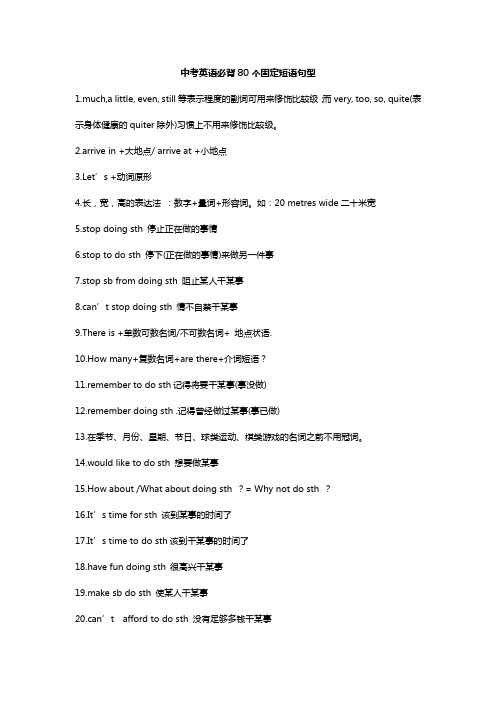
中考英语必背80个固定短语句型1.much,a little, even, still等表示程度的副词可用来修饰比较级;而very, too, so, quite(表示身体健康的quiter除外)习惯上不用来修饰比较级。
2.arrive in +大地点/ arrive at +小地点3.Let’s +动词原形4.长,宽,高的表达法:数字+量词+形容词。
如:20 metres wide二十米宽5.stop doing sth 停止正在做的事情6.stop to do sth 停下(正在做的事情)来做另一件事7.stop sb from doing sth 阻止某人干某事8.can’t stop doing sth 情不自禁干某事9.There is +单数可数名词/不可数名词+ 地点状语.10.How many+复数名词+are there+介词短语?11.remember to do sth记得将要干某事(事没做)12.remember doing sth .记得曾经做过某事(事已做)13.在季节、月份、星期、节日、球类运动、棋类游戏的名词之前不用冠词。
14.would like to do sth 想要做某事15.How about /What about doing sth ?= Why not do sth ?16.It’s time for sth 该到某事的时间了17.It’s time to do sth该到干某事的时间了18.have fun doing sth 很高兴干某事19.make sb do sth 使某人干某事20.can’t afford to do sth 没有足够多钱干某事21.can’t stand doing sth 不能忍受干某事22.mind doing sth 介意干某事23.try to do sth 尽力干某事24.finish doing sth 结束干某事25.decide to do sth 决定干某事26.plan to do sth 计划干某事27.It +takes +sb.+时间+to do sth28.sb. +spend +时间+on sth (in doing sth )29.Can you do sth ?你可以做,,,吗30.be busy doing sth 忙于干某事31.called = named = with the name (of)32.at the age of = when sb was/ were ….33.because of 后面接名词、代词、名词性短语、what从句34.keep doing sth . 表示不间断地持续做某事或一直做某事。
初中英语固定句型结构大全
初中英语固定句型结构大全
初中英语中常用的固定句型结构有以下几种:
1.主语 + 谓语 + 宾语例句:I have a pen. (我有一支钢笔。
)
2.主语 + 谓语 + 补语例句:She is a teacher. (她是一名老师。
)
3.主语 + 谓语 + 宾语 + 宾语补足语例句:I gave him a book. (我给了他一本
书。
)
4.主语 + 谓语 + 状语例句:He works hard every day. (他每天都很努力工作。
)
5.主语 + 谓语 + 宾语 + 状语例句:I will eat lunch at noon. (我将在中午吃午
饭。
)
6.There be 句型例句:There is a cat on the chair. (椅子上有一只猫。
)
7.It is/was + adj. + that/who + 句子例句:It was I who answered the phone.
(是我接的电话。
)
8.It is/was + adj. + for + 人 + to do 例句:It is important for you to study hard.
(你要努力学习是很重要的。
)
这些固定句型结构是初中英语学习的基础,掌握这些句型可以帮助你在学习和使用英语时更加流利和准确。
初中英语固定句型,词组及重要知识点
初中英语固定句型,词组及重要知识点(一句型(一such+名词性词组+that…So+形容词/副词+that…——如此……以致……例如:(1She is such a good teacher that we all love her.她是一个好老师,我们都爱她。
(2It was such a hot day that they didn’t go out for a walk as usual.这么热的天气,他们没有像往常一样去散步。
注意点:1.such+a+形容词+名词+that…,可以改写成:so+形容词+a+名词+that…,例句(1可以改写成:She is so good a teacher that we all love her.2.在such+形容词+名词复数或不可数名词+that…结构中,形容词如果是many/few或much/little时,用so不用such,即:so+many/few+可数名词复数+that…,so+much/little+不可数名词+that…(1There are so many peopl e in the room that I can’t g et in.房间里人太多,我进不去。
(2The man has so much money that he can buy a car.那人很有钱,他能买一辆小汽车。
句型(二 (就近一致There be…,either…or…,neither…nor…,not only…but also…例如:(1There is a pen and two pencils in his pencil-box.他的铅笔盒里有一支钢笔和两支铅笔。
(2Not only you but also I have been to the Great Wall.你和我都没有去过长城。
(3Either you or I am leaving for Shanghai.要么你去上海,要么我去上海。
人教精通英语小学常见的固定搭配
1.Like +名词复数2.Like doing sth 喜欢做某事(长久)3.Like to do sth 喜欢做某事(偶尔)4.情态动词后+动词原形,情态动词没有人称和书的变化5.let sb do(动词原形) sth 让某人做某事6.介词+动词ing7.Would like to do sth =want to do sth 想要某人做某事8.形容词修饰名词,副词修饰动词9.tell sb to do sth 告诉某人做某事10.Tell sb not to do sth 告诉某人不要做某事11.How many +可数名词复数12.Some 用于肯定句,any 用于否定句和疑问句13.and用于肯定句,or 用于否定句和疑问句14.Enjoy doing sth 喜欢做某事(有享受的含义)15.Enjoy oneself 玩的开心,过的愉快=have a good time=have16.teach sb(宾格)sth 教某人某事17.teach sb to do sth教某人做某事18.Teach oneself 自学19.take 带来bring 带走20.be from =come from 来自于21.Both 表示两者都,all 表示三者或三者以上都22.Both ….and …… 两者都23.be happy to do sth 很高兴做某事24.be good at =do well in 擅长做某事25.be interested in doing sth 对做某事感兴趣26.-ing 修饰物,-ed 修饰人27.名修名,复在后,男人女人前后复。
28.look at 看;have a look at…29.Play with 和…玩30.Play+球类;play the+西洋乐器31.go to the +地点去某地32.go+动词ing 去做某事go singing /dancing/fishing/shopping/swimming33.have breakfast /lunch/dinner/supper 吃早中午饭34.have:有;吃;上课,生病等35.let’s =let us 让我们36.be late for 迟到37.be able to do sth=can 能做某事38.be afraid of doing=be afraid to do sth,,,, 害怕39.many修饰可数名词复数;much 修饰不可数名词40.a lot of = lots of 意思是“许多”;既可以修饰可数名词也可以修饰不可数名词。
英语作文固定句型套用
英语作文固定句型套用在学习英语作文写作时,固定句型的运用是提高文章质量和表达能力的一种重要方法。
适当使用一些固定的句型模板可以使我们的文章更加流畅和有条理。
以下是一些常用的英语作文固定句型,希望对大家的写作有所帮助。
引出话题在引出话题时,我们可以使用一些固定的句型来吸引读者的注意和引起共鸣。
1. When it comes to… 2. It is universally acknowledged that… 3. In the fast-paced society we live in today… 4. With the rapid development of technology… 5. Nowadays, more and more people are starting to realize that…表达观点在表达观点时,我们也可以运用一些固定的句型来使我们的观点更加清晰和有说服力。
1. From my perspective 2. It is my firm belief that… 3. Personally, I am of the opinion that… 4. It goes without saying that… 5. As far as I am concerned… 6. It is widely accepted that…表达原因在阐明原因时,使用固定句型可以使我们的论述更加有逻辑性和连贯性。
1. The main reason why… 2. One of the most important reasons is that… 3. It can be attributed to the fact that… 4. Another contributing factor is… 5. The underlying reason is…表达结论在进行总结和得出结论时,也可以采用一些固定句型来结束文章,使整篇文章更加完整。
- 1、下载文档前请自行甄别文档内容的完整性,平台不提供额外的编辑、内容补充、找答案等附加服务。
- 2、"仅部分预览"的文档,不可在线预览部分如存在完整性等问题,可反馈申请退款(可完整预览的文档不适用该条件!)。
- 3、如文档侵犯您的权益,请联系客服反馈,我们会尽快为您处理(人工客服工作时间:9:00-18:30)。
一、接不定式(而不接动名词)作宾语的24个常用动词affordtodosth.负担得起做某事agreetodosth.同意做某事arrangetodosth.安排做某事asktodosth.要求做某事begtodosth.请求做某事caretodosth.想要做某事choosetodosth.选择做某事decidetodosth.决定做某事demandtodosth.要求做某事determinetodosth.决心做某事expecttodosth.期待做某事feartodosth.害怕做某事helptodosth.帮助做某事hopetodosth.希望做某事learntodosth.学习做某事managetodosth.设法做某事offertodosth.主动提出做某事plantodosth.计划做某事preparetodosth.准备做某事pretendtodosth.假装做某事promisetodosth.答应做某事refusetodosth.拒绝做某事wanttodosth.想要做某事wishtodosth.希望做某事注:有些不及物动词后习惯上也接不定式,不接动名词:aimtodosth.旨在做某事failtodosth.未能做某事longtodosth.渴望做某事happentodosth.碰巧做某事hesitatetodosth.犹豫做某事struggletodosth.努力做某事二、接不定式作宾补的36个常用动词.建议某人做某事.允许某人做某事.请(叫)某人做某事.忍受某人做某事.请求某人做某事.导致某人做某事.命令某人做某事.驱使某人做某事.选举某人做某事.鼓励某人做某事.期望某人做某事.禁止某人做某事.强迫某人做某事.使(要)某人做某事.讨厌某人做某事.帮助某人做某事.打算要某人做某事.邀请某人做某事.留下某人做某事.喜欢某人做某事.打算要某人做某事.需要某人做某事.迫使某人做某事.命令某人做某事.允许某人做某事.说服某人做某事.宁愿某人做某事.要求某人做某事.提醒某人做某事.教某人做某事.告诉某人做某事.训练某人做某事.麻烦某人做某事.想要某人做某事.警告某人做某事.希望某人做某事“原谅某人做某事”,excuse[forgive].。
“希望某人做某事”,.。
“建议某人做某事”,.。
“安排某人做某事”,.。
“要求某人做某事”,.。
“感谢某人做某事”,.。
“祝贺某人做某事”,.。
“阻止某人做某事”,.。
三、接动名词(不接不定式)作宾语的34个常用动词admitdoingsth.承认做某事advisedoingsth.建议做某事allowdoingsth.允许做某事appreciatedoingsth.感激做某事avoiddoingsth.避免做某事considerdoingsth.考虑做某事delaydoingsth.推迟做某事denydoingsth.否认做某事discussdoingsth.讨论做某dislikedoingsth.不喜欢做某事enjoydoingsth.喜爱做某事escapedoingsth.逃脱做某事excusedoingsth.原谅做某事fancydoingsth.设想做某事finishdoingsth.完成做某事forbiddoingsth.禁止做某事forgivedoingsth.原谅做某事giveupdoingsth.放弃做某事imaginedoingsth.想象做某事keepdoingsth.保持做某事mentiondoingsth.提及做某事minddoingsth.介意做某事missdoingsth.错过做某事pardondoingsth.原谅做某事permitdoingsth.允许做某事practicedoingsth.练习做某事preventdoingsth.阻止做某事prohibitdoingsth.禁止做某事putoffdoingsth.推迟做某事reportdoingsth.报告做某事riskdoingsth.冒险做某事stopdoingsth.停止做某事suggestdoingsth.建议做某事understanddoingsth.理解做某事四、接现在分词作宾补的20个常用动词.引起某人做某事.碰上(撞上)某人做某事.发现某人做某事.感觉某人做某事.碰上(撞上)某人做某事.使某人做某事.使某人做某事.听见某人做某事.使某人不停地做某事.听某人做某事.看着某人做某事.注意到某人做某事.观察某人做某事.阻止某人做某事.看见某人做某事.使某人(突然)做某事.使(引起)某人做某事.使某人开始做某事.阻止某人做某事.观看某人做某事五、接动词原形作宾补的11个常用动词.感觉某人做某事.使某人做某事.听见某人做某事.让某人做某事.听着某人做某事.看着某人做某事.使某人做某事.注意某人做某事.观察某人做某事.看见某人做某事.观察某人做某事六、接不定式或动名词作宾语意思相同的12个动词liketodosth/likedoingsth.喜欢做某事lovetodosth/lovedoingsth.喜欢做某事hatetodosth/hatedoingsth.憎恨做某事prefertodosth/preferdoingsth.宁可做某事begintodosth/begindoingsth.开始做某事starttodosth/startdoingsth.开始做某事continuetodosth/continuedoingsth.继续做某事can’tbeartodosth/can’tbeardoingsth.不能忍受做某事bothertodosth/botherdoingsth.麻烦做某事intendtodosth/intenddoingsth.想要做某事attempttodosth/attemptdoingsth.试图做某事ceasetodosth/ceasedoingsth.停止做某事七、接不定式或动名词作宾语意思不同的7个动词(1)remembertodosth.记住要做某事rememberdoingsth.记住曾做过某事(2)forgettodosth.忘记要做某事forgetdoingsth.忘记曾做过某事(3)regrettodosth.后悔(遗憾)要做某事regretdoingsth.后悔(遗憾)曾做过某事(4)trytodosth.设法要做某事trydoingsth.做某事试试看有何效果(5)meantodosth.打算做某事meandoingsth.意味着做某事(6)can’thelptodosth.不能帮助做某事can’thelpdoingsth.禁不住做某事(7)goontodosth.做完某事后接着做另一事goondoingsth.继续做一直在做的事注:stoptodosth.与stopdoingsth.也不同,前者指停下来去做某事,后者指停止正在做的事,但stoptodosth.中的不定式不是宾语,是目的状语。
八、可接双宾语的38个常用动词(1)双宾语易位时需借助介词to的常用动词.=.颁奖给某人.=.把某物带给某人.=.把某物递给某人.=.把某物借给某人.=.把某物寄给某人.=.将某物给某人.=.欠某人某物.=.把某物递给某人.=.付给某人某物(钱).=.把某物寄给某人.=.把某物读给某人听.=.把某物还给某人.=.把某物送给某人.=.把某物卖给某人.=.拿某物招待某人.=.拿某物给某人看.=.把某物拿给某人.=.教某人某物.=.告诉某人某情况.=.把某物扔给某人.=.给某人写信(2)双宾语易位时需借助介词for的常用动词.=.为某人预定某物.=.为某人买某物.=.为某人选某物.=.为某人煮某物.=.为某人画某物.=.为某人去取某物.=.为某人找到某物.=.为某人准备某物.=.为某人拿来某物.=.为某人做某物.=.为某人订购某物.=.为某人采摘某物.=.为某人准备某物.=.为某人留某物.=.为某人唱某物(歌).=.为某人让出某物.=.为某人偷某物注:有的动词后接的双宾语易位时,既可用介词to引出间接宾语,也可用介词for引出间接宾语,含义相同,如bring,play等:Bringmetoday’spaper.=Bringtoday’spaperto[for]me.把今天的报纸拿给我。
Heplayedustherecordhehadjustbought.=Hepla yedtherecordhehadjustboughtfor[to]us.他放了他刚买的唱片给我们听。
有的动词后接的双宾语易位时,即可用介词to 引出间接宾语,也可用介词for引出间接宾语,含义不同,如leave等:Theyleftmenofood.=Theyleftnofoodforme.他们没给我留一点食物。
Myuncleleftmealargefortune.=Myuncleleftal argefortunetome.我叔叔死后留下一大笔财产给我。
而有的动词后接双宾语时,既不能用介词to引出间接宾语,也不能用介词for引出间接宾语,如allow,ask,cause,charge,cost,forgive,refus e等:Heallowshissontoomuchmoney.他给他儿子的钱太多。
Heaskedmesomequestions.他问了我一些问题。
Hechargedmefivedollarsforacupoftea.他一杯茶向我要了5美元。
Hismistakecosthimhisjob.他的错误让他丢了工作。
Ienvyyouyourgoodluck.我羡慕你的好运。
Theyforgavehimhisrudeness.他们原谅了他的鲁莽。
Herefusedhernothing.她要什么就给什么。
九、可用于“动词+sb+ofsth”的8个常见动词.控告某人犯某事(罪),指责某人做某事.骗取某人某物.治好某人的病,改掉某人的坏习惯.通知某人某情况(事).使某人想起某情况(事).使某人摆脱某物.抢劫某人的某东西.警告某人有某情况十、可用于“动词+sb+fordoingsth”的8个常见动词.指责某人做某事.批评某人做某事.原谅某人做某事.原谅某人做某事.原谅某人做某事.惩罚某人做某事.指责(责备)某人做某事.感谢某人做某事十一、可用于“动词+sb+intodoingsth”的9个常见动词.欺骗某人做某事.欺骗某人做某事.欺骗某人做某事.迫使某人做某事.说服某人做某事.说服某人做某事.威胁某人做某事.吓唬某人做某事.说服某人做某事十二、容易误用作及物动词的9个不及物动词误:dealaproblem正:dealwithaproblem处理问题误:dependsb.正:dependonsb.依靠(依赖)某人误:insistdoingsth.正:insistondoingsth.坚持要做某事误:knockthedoor正:knockon[at]thedoor敲门误:operatesb.正:operateonsb.为某人做手术误:participatesth.正:participateinsth.参加某事误:refersth.正:refertosth.查阅(参考)某物误:relysb./sth.正:relyonsb./sth.依靠(依赖)某人(某物误:replyaletter正:replytoaletter回信注:在某些其他用法中,以上有的动词也可能及物,如insist,reply等动词后可接宾语从句,operate 表示“操作”、“管理”等时则及物。
